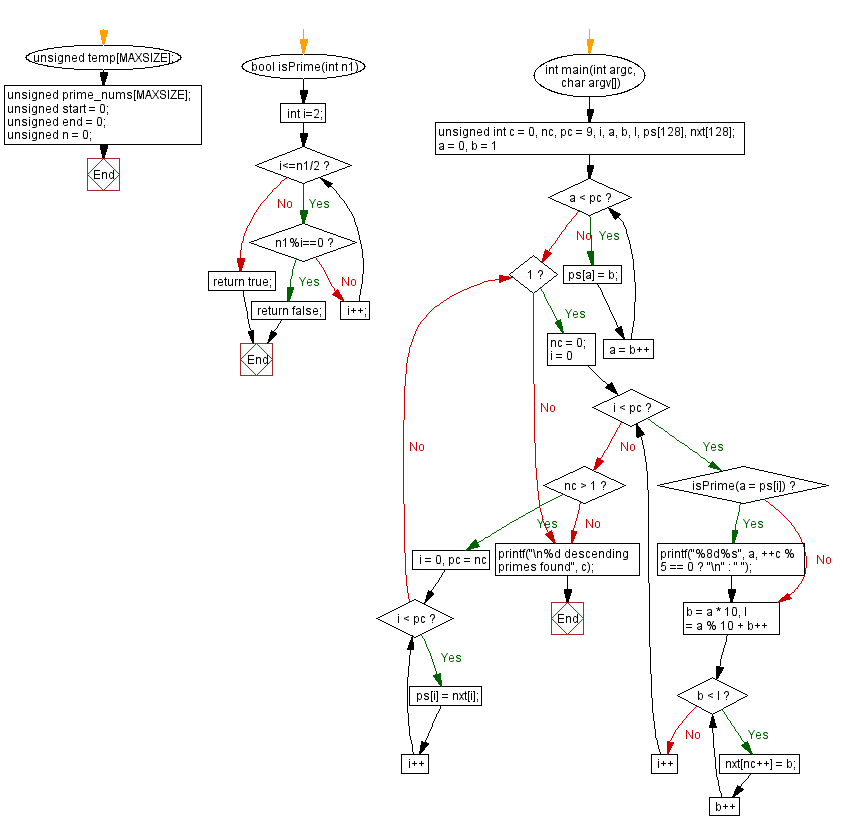C Exercises: Prime number in strictly descending decimal digit order
32. Descending Prime Numbers (C# Sharp to C Adaptation) Variants
Write a C# Sharp program to create and display all prime numbers in strictly descending decimal digit order.
Sample Data:
2, 3, 5, 7, 31, 41, 43, 53, 61, 71, 73, 83, 97, 421, 431.....
C Code:
//Source:shorturl.at/eFRX1
#include <stdio.h>
#include <stdlib.h>
#include <stdbool.h>
#include <math.h>
#define MAXSIZE 1000
unsigned temp[MAXSIZE];
unsigned prime_nums[MAXSIZE];
unsigned start = 0;
unsigned end = 0;
unsigned n = 0;
bool isPrime(int n1)
{
int i=2;
while(i<=n1/2)
{
if(n1%i==0)
return false;
else
i++;
}
return true;
}
int main(int argc, char argv[])
{
unsigned int c = 0, nc, pc = 9, i, a, b, l,
ps[128], nxt[128];
for (a = 0, b = 1; a < pc; a = b++) ps[a] = b;
while (1) {
nc = 0;
for (i = 0; i < pc; i++) {
if (isPrime(a = ps[i]))
printf("%8d%s", a, ++c % 5 == 0 ? "\n" : " ");
for (b = a * 10, l = a % 10 + b++; b < l; b++)
nxt[nc++] = b;
}
if (nc > 1) for(i = 0, pc = nc; i < pc; i++) ps[i] = nxt[i];
else break;
}
printf("\n%d descending primes found", c);
}
Sample Output:
1 2 3 5 7
31 41 43 53 61
71 73 83 97 421
431 521 541 631 641
643 653 743 751 761
821 853 863 941 953
971 983 5431 6421 6521
7321 7541 7621 7643 8431
8521 8543 8641 8731 8741
8753 8761 9421 9431 9521
9631 9643 9721 9743 9851
9871 75431 76421 76541 76543
86531 87421 87541 87631 87641
87643 94321 96431 97651 98321
98543 98621 98641 98731 764321
865321 876431 975421 986543 987541
987631 8764321 8765321 9754321 9875321
97654321 98764321 98765431
88 descending primes found
Flowchart:

For more Practice: Solve these Related Problems:
- Write a C program to generate prime numbers in strictly descending decimal digit order.
- Write a C program to count and display primes with digits in descending order within a given range.
- Write a C program to sort a list of prime numbers based on their descending digit order and output the sorted list.
- Write a C program to compare descending and ascending digit order primes and print their differences.
Go to:
PREV : Progression Type & Next Member Variants.
NEXT : Attractive Numbers Generation Variants.
C Programming Code Editor:
Contribute your code and comments through Disqus.
What is the difficulty level of this exercise?
Test your Programming skills with w3resource's quiz.
